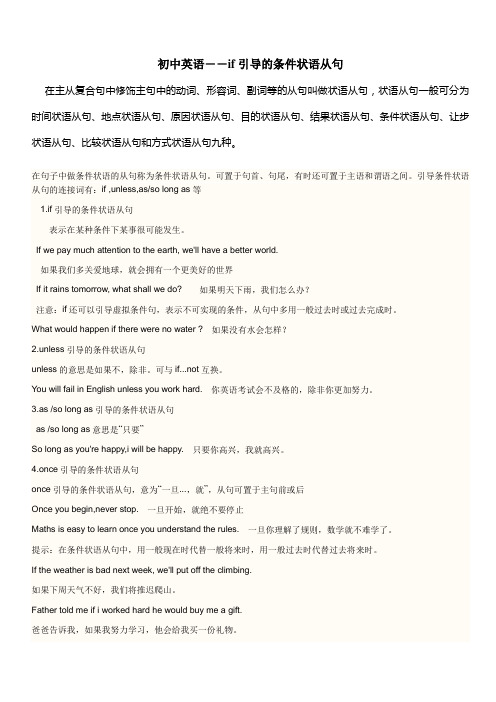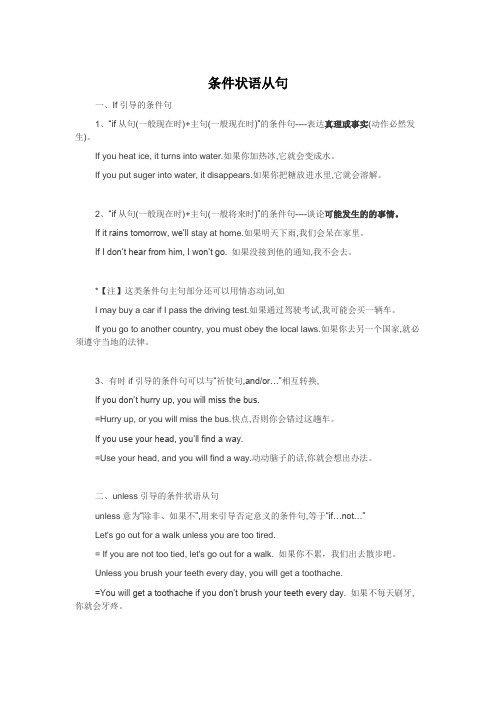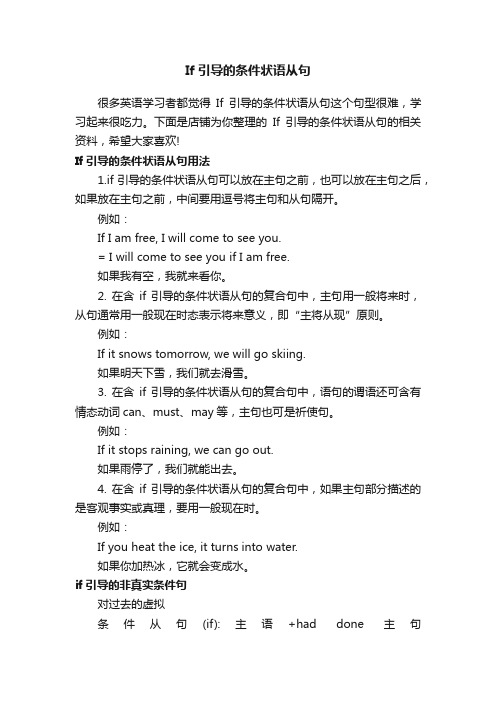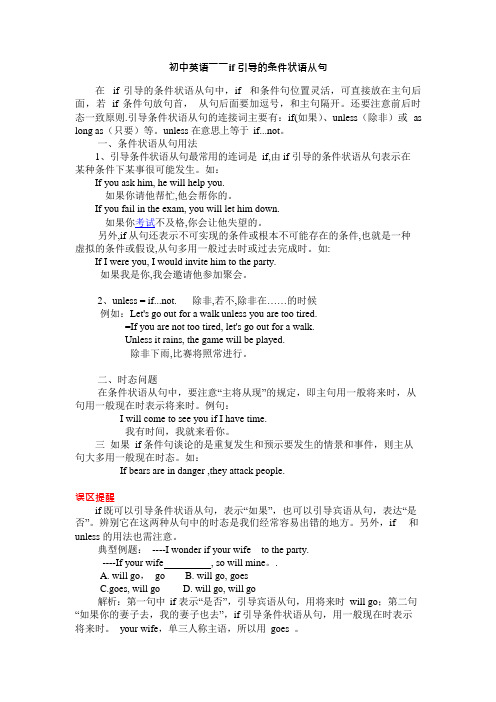(完整word版)初中英语If引导的条件状语从句
初中英语——If引导的条件状语从句

初中英语――if引导的条件状语从句在主从复合句中修饰主句中的动词、形容词、副词等的从句叫做状语从句,状语从句一般可分为时间状语从句、地点状语从句、原因状语从句、目的状语从句、结果状语从句、条件状语从句、让步状语从句、比较状语从句和方式状语从句九种。
在句子中做条件状语的从句称为条件状语从句。
可置于句首、句尾,有时还可置于主语和谓语之间。
引导条件状语从句的连接词有:if ,unless,as/so long as等1.if引导的条件状语从句表示在某种条件下某事很可能发生。
If we pay much attention to the earth, we'll have a better world.如果我们多关爱地球,就会拥有一个更美好的世界If it rains tomorrow, what shall we do? 如果明天下雨,我们怎么办?注意:if还可以引导虚拟条件句,表示不可实现的条件,从句中多用一般过去时或过去完成时。
What would happen if there were no water ? 如果没有水会怎样?2.unless引导的条件状语从句unless的意思是如果不,除非。
可与if...not互换。
You will fail in English unless you work hard. 你英语考试会不及格的,除非你更加努力。
3.as /so long as引导的条件状语从句as /so long as意思是“只要”So long as you're happy,i will be happy. 只要你高兴,我就高兴。
4.once引导的条件状语从句once引导的条件状语从句,意为“一旦...,就”,从句可置于主句前或后Once you begin,never stop. 一旦开始,就绝不要停止Maths is easy to learn once you understand the rules. 一旦你理解了规则,数学就不难学了。
If 引导的条件状语从句

If 引导的条件状语从句If引导的条件状语从句需要遵循主过从过、主将从现的原则。
例如,如果明天下雨,我就不会去爬山。
如果明天不下雨,我就会和朋友去乡村。
如果你帮我,我就能按时完成。
如果明天天气好,我们可能会出去。
如果你完成了作业,你就可以看电视。
如果你下周日去购物,请给我打电话。
如果我去那里,我会给她带些花。
如果明天下雨,我们会待在家里。
如果他在家,请给我打电话。
如果你更加努力,你就能通过考试。
如果她明天有时间,她会去看望她的爷爷。
如果火车没有准时到达,我们会坐出租车去市区。
如果老师迟到了,他会生气。
除此之外,如果否定形式的if可以转换成肯定形式的unless,例如你如果不努力,你就不能通过考试,可以转换成你除非努力,否则你就不能通过考试。
With your help。
I will be ___.If you wake up early。
you will arrive on time.Wake up early。
or you will be late.If you wake up early。
you won't be late for school.Wake up early。
and you will catch the early bus.1.I will tell you about your friend.Answer: A。
come2.If you go to college。
you will get a good ___. Answer: A。
will get3.I want to know if they will come tomorrow. Answer: B。
will come4.___ exercise。
and you'll be in good health. Answer: D。
and5.If it doesn't rain。
he will play ___.Answer: If it doesn't rain。
初中英语知识点归纳条件状语从句的引导词和用法

初中英语知识点归纳条件状语从句的引导词和用法条件状语从句是英语语法中的一种特殊句型,用来表示某个条件成立时会发生的情况。
在条件状语从句中,引导词起到引导从句的作用。
本文将对初中英语知识点中的条件状语从句的引导词和用法进行归纳。
一、if引导的条件状语从句1. 当主句是一般现在时时,条件状语从句可以是一般现在时或should + 动词原形。
例如:- If he comes early, we will go to the movies together.- If it rains tomorrow, we should stay at home.2. 当主句是一般过去时时,条件状语从句要用过去时态。
例如:- If I had money, I would buy a new car.- If he studied hard, he could pass the exam.3. 当主句是一般将来时时,条件状语从句可以使用一般现在时或一般过去时。
例如:- If you go shopping, I will wait for you here.- If I had time, I would help you with your homework.二、unless引导的条件状语从句1. Unless 在句中的含义与if相反,表示“除非”,引导的条件状语从句与if引导的条件状语从句的用法相同。
例如:- I won't go to the party unless you invite me.- Unless you practice more, you won't improve your English.三、as long as引导的条件状语从句1. As long as 表示“只要”,引导的条件状语从句要使用一般现在时。
例如:- You can join us as long as you finish your homework.- As long as you work hard, you will succeed.四、in case引导的条件状语从句1. In case 表示“以防”,引导的条件状语从句使用一般现在时。
if引导的条件状语从句与专题练习(可编辑修改word版)

if 引导的条件状语从句引导条件状语从句最常用的连词是if ,常见的 if 条件状语从句表示在某条件下某事很可能发生。
如:If you ask me ,I will answer you.If it rains tomorrow, I will stay at home.I will stay at home if it rains tomorrow.另外, if 从句还表示不可实现的条件或根本不可能存在的条件,也就是一种虚拟的条件或假设。
从句多用一般过去时或过去完成时,表示对现在或过去的一种假设。
如:If I were in university ,I would ⋯.If I had enough money ,I would buy a car.1.i f 从句用一般现在时,主句用一般将来时If he runs , he’ll get there in time.2.i f 从句用一般现在时,主句用 may/might/can/must If the fog getsthicker the plane may/might be diverted.3.i f 从句用一般现在时,主句用一般现在时If you heat ice it turns to water. (也可用 will turn)4.if 从句用现在进行时,主句用一般将来时If you are looking for Peter you ’ ll find him upstairs.5.if 从句用现在完成时,主句用一般将来时If you have finished dinner I ’ ll ask the waiter for the bill.一、用所给词的适当形式填空1.If you (feel) tired, you (have) to have arest.3. If there (be) fewer trees, there ( be) more pollution.5.If Marcia (live) alone, she( keep) a pet parrot.na ( buy) a new dress if the old one(be) out of style.9.Peter ( send) me a beautiful souvenir if he(tour) Spain.10.If Mr Green (say) I am hard- working, my parents( feel) glad.11.I (go) to the beach if it ( not rain)this week.13.H e (write) a letter to his grandparents if he (get) his reportcard this week.14.If she (get) up late, she ( not catch)the early bus.15.Peter (major) in English if he (pass) the exams in Peking University.16.如果努力学习,你就会取得好成绩。
条件状语从句

条件状语从句一、If引导的条件句1、“if从句(一般现在时)+主句(一般现在时)”的条件句----表达真理或事实(动作必然发生)。
If you heat ice, it turns into water.如果你加热冰,它就会变成水。
If you put suger into water, it disappears.如果你把糖放进水里,它就会溶解。
2、“if从句(一般现在时)+主句(一般将来时)”的条件句----谈论可能发生的的事情。
If it rains tomorrow, we’ll stay at home.如果明天下雨,我们会呆在家里。
If I don’t hear from him, I won’t go. 如果没接到他的通知,我不会去。
*【注】这类条件句主句部分还可以用情态动词,如I may buy a car if I pass the driving test.如果通过驾驶考试,我可能会买一辆车。
If you go to another country, you must obey the local laws.如果你去另一个国家,就必须遵守当地的法律。
3、有时if引导的条件句可以与“祈使句,and/or…”相互转换,If you don’t hurry up, you will miss the bus.=Hurry up, or you will miss the bus.快点,否则你会错过这趟车。
If you use your head, you’ll find a way.=Use your head, and you will find a way.动动脑子的话,你就会想出办法。
二、unless引导的条件状语从句unless意为“除非、如果不”,用来引导否定意义的条件句,等于“if…not…”Let's go out for a walk unless you are too tired.= If you are not too tied, let's go out for a walk. 如果你不累,我们出去散步吧。
if 引导条件状语从句

if 引导条件状语从句
摘要:
1.条件状语从句的定义
2.if 引导条件状语从句的语法结构
3.if 引导条件状语从句的用法和实例
正文:
条件状语从句是用来表示一个条件,即如果某个条件成立,那么就会发生某个结果。
在英语中,条件状语从句通常由if 引导。
语法结构:
if + 条件从句(主语+ 谓语+ 其他成分)
主句(主语+ 谓语+ 其他成分)
if 引导条件状语从句的用法和实例:
1.肯定句中的条件状语从句
If it is hot, we will go to the beach.(如果天气热,我们将去海滩。
)
2.否定句中的条件状语从句
If it is not hot, we will go to the park.(如果天气不热,我们将去公园。
)
3.一般疑问句中的条件状语从句
Will you help me if I need your help?(如果我需要你的帮助,你会帮助我吗?)
4.特殊疑问句中的条件状语从句
What will you do if you win the lottery?(如果你中彩票,你会做什么?)
通过以上实例,我们可以看到if 引导条件状语从句在各种句子类型中的用法。
If引导的条件状语从句

If引导的条件状语从句很多英语学习者都觉得If引导的条件状语从句这个句型很难,学习起来很吃力。
下面是店铺为你整理的If引导的条件状语从句的相关资料,希望大家喜欢!If引导的条件状语从句用法1.if引导的条件状语从句可以放在主句之前,也可以放在主句之后,如果放在主句之前,中间要用逗号将主句和从句隔开。
例如:If I am free, I will come to see you.= I will come to see you if I am free.如果我有空,我就来看你。
2. 在含if引导的条件状语从句的复合句中,主句用一般将来时,从句通常用一般现在时态表示将来意义,即“主将从现”原则。
例如:If it snows tomorrow, we will go skiing.如果明天下雪,我们就去滑雪。
3. 在含if引导的条件状语从句的复合句中,语句的谓语还可含有情态动词can、must、may等,主句也可是祈使句。
例如:If it stops raining, we can go out.如果雨停了,我们就能出去。
4. 在含if引导的条件状语从句的复合句中,如果主句部分描述的是客观事实或真理,要用一般现在时。
例如:If you heat the ice, it turns into water.如果你加热冰,它就会变成水。
if引导的非真实条件句对过去的虚拟条件从句(if):主语+had done 主句might/would/should/could+have done对现在的虚拟if+ 主语+动词过去式(be用were)主句might/would/should/could+do对将来的虚拟if+主语+动词过去式(be用were)或主语+should do或主语+were to do主句 might/would/should/could+doe.g.Tom got to the station in time because he started earlier.If Tom had started late, he would have missed the train.Do you think the thief entered through the door?No, if he had, I don't believe, he would have broken the living room window.If the book weren't so expensive, I would buy it.If you didn't live so far away, we would be able to visit you more.What would you do if you lost your passport in a foreign country?Why hasn't he come? If he should not come on time, we would have to put off the trip.2.注意事项e.g.If she hadn't work hard at English in the past, she wouldn't work as well as a secretary in a large company now. 混合时间的虚拟语气从句为对过去的虚拟,主句是现在。
初中英语If引导的条件状语从句(可编辑修改word版)

初中英语――if 引导的条件状语从句在if 引导的条件状语从句中,if 和条件句位置灵活,可直接放在主句后面,若if 条件句放句首,从句后面要加逗号,和主句隔开。
还要注意前后时态一致原则.引导条件状语从句的连接词主要有:if(如果)、unless(除非)或as long as(只要)等。
unless 在意思上等于if...not。
一、条件状语从句用法1、引导条件状语从句最常用的连词是if,由if 引导的条件状语从句表示在某种条件下某事很可能发生。
如:If you ask him, he will help you.如果你请他帮忙,他会帮你的。
If you fail in the exam, you will let him down.如果你考试不及格,你会让他失望的。
另外,if 从句还表示不可实现的条件或根本不可能存在的条件,也就是一种虚拟的条件或假设,从句多用一般过去时或过去完成时。
如:If I were you, I would invite him to the party.如果我是你,我会邀请他参加聚会。
2、unless = if...not. 除非,若不,除非在……的时候例如:Let's go out for a walk unless you are too tired.=If you are not too tired, let's go out for a walk.Unless it rains, the game will be played.除非下雨,比赛将照常进行。
二、时态问题在条件状语从句中,要注意“主将从现”的规定,即主句用一般将来时,从句用一般现在时表示将来时。
例句:I will come to see you if I have time.我有时间,我就来看你。
三如果if 条件句谈论的是重复发生和预示要发生的情景和事件,则主从句大多用一般现在时态。
- 1、下载文档前请自行甄别文档内容的完整性,平台不提供额外的编辑、内容补充、找答案等附加服务。
- 2、"仅部分预览"的文档,不可在线预览部分如存在完整性等问题,可反馈申请退款(可完整预览的文档不适用该条件!)。
- 3、如文档侵犯您的权益,请联系客服反馈,我们会尽快为您处理(人工客服工作时间:9:00-18:30)。
初中英语――if引导的条件状语从句在if 引导的条件状语从句中,if 和条件句位置灵活,可直接放在主句后面,若if 条件句放句首,从句后面要加逗号,和主句隔开。
还要注意前后时态一致原则.引导条件状语从句的连接词主要有:if(如果)、unless(除非)或as long as (只要)等。
unless在意思上等于if...not。
一、条件状语从句用法1、引导条件状语从句最常用的连词是if,由if引导的条件状语从句表示在某种条件下某事很可能发生。
如:If you ask him, he will help you.如果你请他帮忙,他会帮你的。
If you fail in the exam, you will let him down.如果你考试不及格,你会让他失望的。
另外,if从句还表示不可实现的条件或根本不可能存在的条件,也就是一种虚拟的条件或假设,从句多用一般过去时或过去完成时。
如:If I were you, I would invite him to the party.如果我是你,我会邀请他参加聚会。
2、unless = if...not.除非,若不,除非在……的时候例如:Let's go out for a walk unless you are too tired.=If you are not too tired, let's go out for a walk.Unless it rains, the game will be played.除非下雨,比赛将照常进行。
二、时态问题在条件状语从句中,要注意“主将从现”的规定,即主句用一般将来时,从句用一般现在时表示将来时。
例句:I will come to see you if I have time.我有时间,我就来看你。
三如果if 条件句谈论的是重复发生和预示要发生的情景和事件,则主从句大多用一般现在时态。
如:If bears are in danger ,they attack people.误区提醒if 既可以引导条件状语从句,表示“如果”,也可以引导宾语从句,表达“是否”。
辨别它在这两种从句中的时态是我们经常容易出错的地方。
另外,if 和unless的用法也需注意。
典型例题:----I wonder if your wife to the party.----If your wife _________, so will mine。
.A. will go,goB. will go, goesC.goes, will goD. will go, will go解析:第一句中if表示“是否”,引导宾语从句,用将来时will go;第二句“如果你的妻子去,我的妻子也去”,if引导条件状语从句,用一般现在时表示将来时。
your wife,单三人称主语,所以用goes 。
总结IF引导的一、表示将来可能发生的:(1) If sb does sth, sb will do sth= sb will do sth if sb does sth主句一般将来时从句一般现在时(2)主句为祈使句或情态动词形式If sb does sth, please do sthIf sb does sth, sb may(情态动词) do sth二、表必然发生的If sb does sth, sb/sth does sth= sb/sth do sth if sb does sth主句一般现在时,从句一般现在时(相当于when引导的从句)Unless引导的sb will do sth unless sb does sthif sb does not do sth练习1.He ______ (fail) in the exam if he ______ (not study) hard.2.Unless you ______ (leave) now, you ______(be) late.3.We ______ (have) a barbecue unless it ______ (rain) .4.Hurry up, or you will miss the bus.(同义句转换)___ you don’t hurry up, you ____ catch the early bus.5.Study hard, or you’ll miss fall behind.(同义句转换)______ you study hard, you______ fall behind.6.If you don’t put on your scarf, you’ll catch cold.(同义句转换)Put on your scarf, _____ you’ll catch cold.7.I don’t know if it_______ tomorrow. )(表是否,用将来时态)If it ____ ,I won’t go shopping. (rain)(表如果,用现在时态)8.I want to know if he _________(come) tomorrow, if he _______(come),I __________(give) the massage to him.9. Please let us know if he ________(arrive) tomorrow.请告诉我们他明天是否会来Please let us know if he _________ (arrive) tomorrow.如果他明天来的话请告诉我们10.I’m sure if he _____(go) to the party, he________ (have) a great time.11.If the rain _______(stop) tonight, we will go to the cinema.12.I’ll buy a computer if I ______(have) enough money.13.You _________(not get) nervous if you _____(do ) enough exercise.14.If she ____ (be) kind to me , I __________(not argue) with her.15.If you _____(pay) more attention to that, he _________ (not get) injured.16.Mr Li will be mad if we _______(break) the rules.17. If it _____ (be) cloudy, they _______(not go) there by air.18.Shall I say “Hello” when the foreigner ______(come) into the classroom?19.He’ll get better grades if he _________ (study )hard.20. If you work really hard, you _______ (be) famous and rich.if 条件状语从句的时态练习一.在正确的答案下划一条线。
1.Daina ( will go/go/goes) to Europe if she (will pass/pass/passes) the exams .2. The graduates (will teach/teach/teaches) in the poor village if the Ministry of Education (will agree/ agree/agrees) soon.3. If a UFO (will land/land/lands) in front of me, I (will go/go/goes) in to look for the alien.4. If he (will have/have/has) money, he (will bulid/build/builds) a science lab.5.Don’t wait for me if I (am/ will be) late.6.They (won’t/don’t) go to the beach if it (will rain/rain /rains).7. I (will call/ call) you if he (will stay/stay /stays) at home.8. (Will / Do/ Does) he visit the museum if he (won’t / don’t/ doesn’t) get tired?9. Where (will/ do/does) they live if they (will miss/ miss/ misses) the bus?二、用所给词的适当形式填空1.If you ________(feel) tired, you _______________ (have) to have a rest.3. If there __________(be) fewer trees, there _______________( be) more pollution.5. If Marcia _____________(live) alone, she ___________________( keep) a pet parrot.6. Lana ________________( buy) a new dress if the old one ____________(be) out of style.7.The twins ______________(fight) if they_______________(argue).8. I ____________(have) a bake sale if I _____________(need) money for education.9. Peter _____________( send) me a beautiful souvenir if he ________________(tour) Spain.10. If Mr Green ___________(say) I am hard- working, my parents _________( feel) glad.11.I ____________(go) to the beach if it________________ ( not rain) this week.12. __________they __________( have) a match if the P.E. teacher _____________(be) busy?13.He ____(write) a letter to his grandparents if he ____(get) his report card this week.14. If she ____________(get) up late, she _____________ ( not catch) the early bus.15. Peter ________(major) in English if he ____(pass) the exams in Peking University.Ⅰ.单项选择(15分)1.If you _____ to the party, you’ll have a great time. A. will go B. went C. go D. going2. It will be a long time ____ Peter _____ his work.A. since, has finishedB. after, finishesC. when, will finishD. before, finishes.3. What will father _____ us from Japan? A. take B. bring C. carry D. make4. Weifang is famous ______ kites. A. for B. to C. on D. with5.I ____ her the answer if she ____me.A. can tell, will askB. will tell, will askC. would tell, askD. will tell, asks6. – What are you going to do tomorrow?--We’ll go to the library tomorrow if it ___.A. isn’t rainB. rainC. won’t rainD. doesn’t rain7.—Do you know when he will come back tomorrow?--Sorry, I don’t know. When he ____ back, I’ll t ell you.A. comesB. will comeC. comeD. may come8. What will you do if you _____ to the old folk’s home visit?A. goB. wentC.goingD. will go9. If I eat ____ food, I’ll be very fat.A. too manyB. many tooC. too muchD. much too10. I’ll give the book to him if he ___ here next Sunday.A. will comeB. comesC. is comingD. came1---5 CDBAD 6---10 DAACB 11---15。
